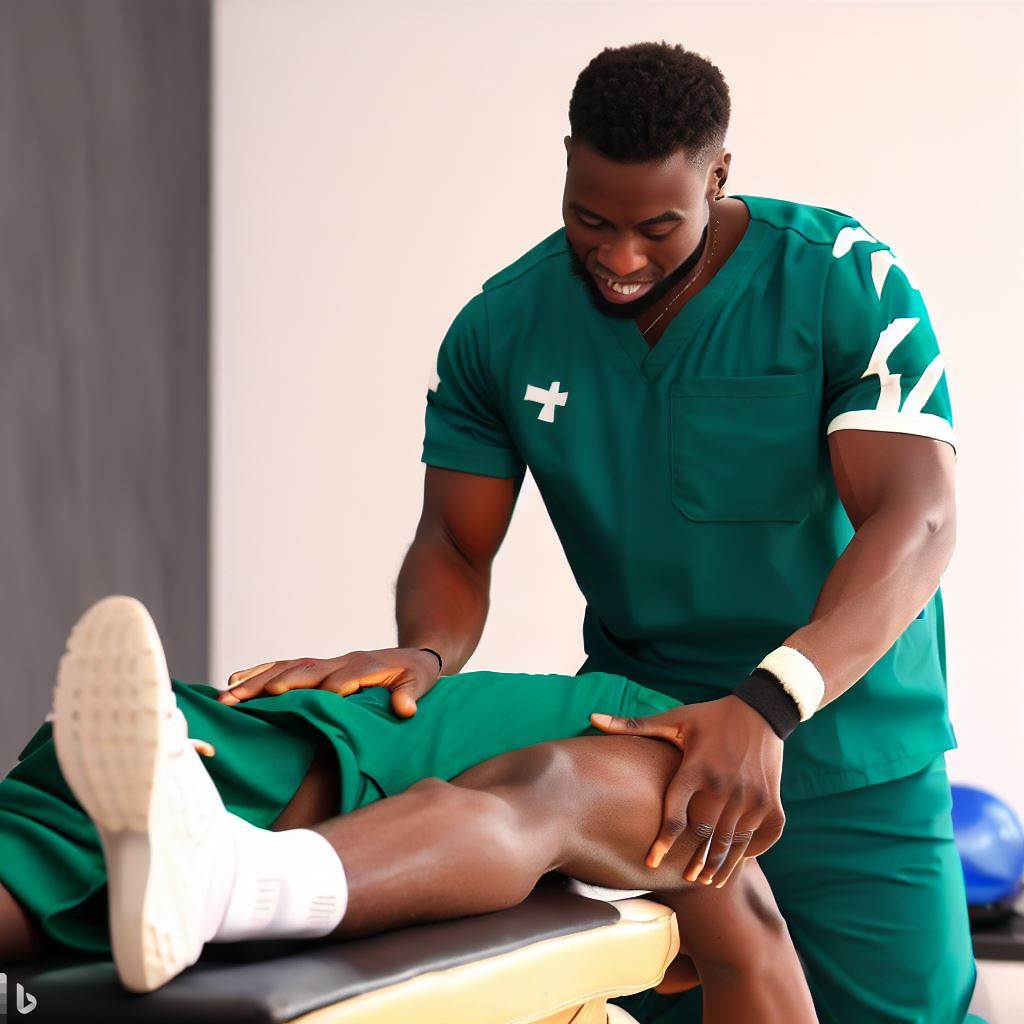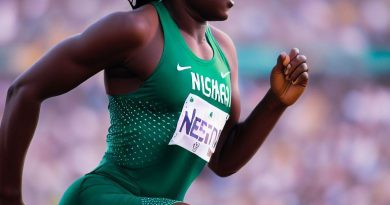Careers Behind the Scenes in Nigeria’s Sports Industry
Last Updated on July 28, 2023
Introduction
Nigeria is a country known for its passion for sports. The sports industry has experienced rapid growth in recent years, with an increased focus on grassroots development of athletes.
Behind the scenes, there are individuals who play vital roles in ensuring that the industry thrives.
These careers include sports journalists, sports administrators, sports marketers, sports analysts, and many more.
In this blog section, we will take a closer look at these careers and their importance in shaping Nigeria’s sports industry.
As we delve into this topic, we will highlight the relevance of these careers and their impact on the country’s sports industry.
Join us on this exciting journey as we explore the careers that make Nigeria’s sports industry tick.
Jobs in Media and Broadcasting in Nigeria’s Sports Industry
Media and broadcasting play a crucial role in the sports industry by creating content, covering live events, and publicizing sports.
The job opportunities in media and broadcasting in Nigeria’s sports industry are plenty, with an increasing demand for qualified professionals in this field.
Roles of Media and Broadcasting in Sports
The role of media and broadcasting in sports is diverse and complex.
Through media coverage and broadcasting, fans can stay connected and engaged with their favorite sports and athletes.
Media and broadcasting provide a platform for the presentation of sports news, highlights, analysis, and interviews with players/participants.
Broadcasting networks also showcase different sports events and games on television, radio, or online streaming platforms.
In summary, media and broadcasting offer an avenue for engrossing sports content and help in providing sporting events to audiences that would ordinarily not have access to them.
Examples of Media and Broadcasting Jobs in Nigeria’s Sports Industry
The sports media and broadcasting industry in Nigeria have diverse and exciting job profiles that range from journalism, video production, social media management, commentary, and analysis.
Some of the jobs available in the media industry include:
- Sports Presenter
- Sports Videographer
- Sports Editor
- Sports Producer
- Radio/TV Sports Commentator
- Sports Analyst
- Social Media Manager
The broadcasting industry also has job opportunities like:
- Camera Operator
- Sound Engineer
- Program Scheduler
- Broadcasting Technician
- Video Editor
- Production Manager
- Graphics Designer
Qualifications and Skills Required for these Jobs
The qualifications and skills required for sports media and broadcasting jobs in Nigeria vary according to job roles. However, there are some essential qualifications and skills that employers expect.
For journalism and commentary jobs like radio/TV commentaries or analysts, employers usually require a degree in journalism, mass communication, or related fields.
For jobs in broadcasting, a diploma or degree in broadcast journalism or video production is also required.
Social media managers require a degree in marketing, advertising, digital marketing, communication, or similar fields, along with relevant work experience.
Skills like communication, creativity, attention to detail, and research ability are essential for jobs in media and broadcasting.
Other skills include sound technical knowledge of broadcasting equipment and software, video editing, and audio production.
The media and broadcasting industry in Nigeria’s sports sector is increasing with the rising popularity of sports and public interest.
The industry provides opportunities to build exciting careers that offer wide-ranging challenges and an avenue to explore one’s passion for sports broadcasting, journalism, commentary, and production.
Prospective job seekers seeking employment in media and broadcasting jobs in Nigeria’s sports industry must acquire the right qualifications and skills required for the job and keep developing their knowledge of sports in general.
Read: How Nigeria’s Athletics Sector Influences Youth
Jobs in Event Management
Event management is a crucial aspect of the sports industry in Nigeria. Sporting events like football matches, athletics competitions, and basketball games require planning and organization to ensure that they run smoothly. This is where event management professionals come in.
Here are some examples of event management jobs in Nigeria’s sports industry
- Event Coordinator: Responsible for planning and coordinating all aspects of a sporting event, including logistics, marketing, and communication with stakeholders.
- Marketing Manager: Develops and implements marketing strategies to promote sporting events and increase ticket sales.
- Media Director: Oversees the production and distribution of all media materials related to a sporting event, including press releases, social media content, and live broadcasts.
- Volunteer Coordinator: Manages a team of volunteers to support sporting events by assigning roles, providing training, and ensuring their smooth operation.
In Nigeria’s sports industry, event management professionals play a vital role.
Employers prefer candidates with a bachelor’s degree in event management, marketing, or related fields.
Essential skills include organization, communication, problem-solving, and leadership. They must handle pressure, multitask, and manage teams effectively.
Attention to detail is crucial to avoid mistakes with significant consequences.
Quick thinking and creative problem-solving are essential for handling unforeseen challenges like bad weather or schedule changes.
Flexibility and adaptability are necessary due to the unpredictable nature of the industry.
Event managers coordinate all aspects of sporting events for smooth execution.
If you’re passionate about sports and thrive in a fast-paced environment, event management could be an excellent career choice for you.
Read: Navigating the Nigerian Sports Industry: A Guide

Jobs in sports marketing and sponsorship
When it comes to the sports industry, there are many careers that people might not know about. One example is the field of sports marketing and sponsorship.
This area of sports is essential for the financial success of teams and athletes.
Here is a breakdown of sports marketing and sponsorship jobs in Nigeria’s sports industry:
Description of the role of sports marketing and sponsorship in sports
- Sports marketing and sponsorship involve promoting a team, athlete, or event to attract and engage fans.
- These professionals create exposure for the team or athlete through advertising, public relations, and social media.
- In exchange for their services, sports marketers and sponsorships often receive a percentage of the revenue that comes from ticket sales, merchandise, and advertising.
Examples of sports marketing and sponsorship jobs in Nigeria’s sports industry
- Brand Manager – responsible for developing and implementing marketing strategies for a sports team or athlete.
- Marketing Coordinator – assists the brand manager with coordinating events, creating promotions, and managing social media platforms.
- Sponsorship Manager – responsible for securing sponsorships from corporations and creating mutually beneficial relationships between the sponsor and the sports team or athlete.
Qualifications and skills required for these jobs
- Strong communication and interpersonal skills to build relationships with potential sponsors and fans.
- Excellent project management skills to organize promotional events and campaigns.
- An understanding of sports marketing and sponsorships, with a background in business or marketing.
- Flexibility to work irregular hours, including weekends and evenings, to attend sporting events and promotional activities.
The jobs in sports marketing and sponsorship are crucial for the growth and success of Nigeria’s sports industry.
With their skills and expertise, these professionals help to attract fans, enhance the performance of athletes and teams, and increase revenue for the industry.
Read: Future Prospects for Nigeria’s Athletics Industry
Jobs in Coaching and Training
Coaching and training are vital elements in the sports industry, as they play a crucial role in ensuring that athletes are at the top of their game.
Coaches and trainers are responsible for guiding and mentoring athletes, developing their skills and techniques, building their confidence, and helping them reach their full potential.
Importance of Coaching and Training in Sports
In any sport, coaching and training are crucial for both individual athletes and teams.
Coaches and trainers not only help athletes improve their physical and technical abilities, but they also provide emotional support, encouragement, and guidance, helping athletes to deal with the stress and pressure of competition.
They identify the strengths and weaknesses of athletes and develop customized training programs to help them overcome their limitations.
Coaching and training are also essential for the sustainability and growth of the sports industry.
They prepare athletes to participate and excel in national and international competitions, which in turn promotes the reputation and development of the sports industry in Nigeria and beyond.
Examples of Coaching and Training Jobs in Nigeria’s sports industry
- Head Coach
- Assistant Coach
- Strength and Conditioning Coach
- Fitness Trainer
- Performance Analyst
- Athletic Trainer
Qualifications and Skills Required for These Jobs
Qualifications and skills required for coaching and training jobs in the sports industry vary depending on the level of coaching/training and the sport in question.
However, in general, here are some essential qualifications and skills:
- Bachelor’s degree in Physical Education, Coaching, Exercise Science, or related field
- Professional certification or credentials in coaching/training
- Experience as an athlete in the specific sport
- Experience coaching/training athletes in the specific sport
- Strong communication and interpersonal skills
- Ability to provide constructive feedback and motivation to athletes
- Understanding of sports science, nutrition, and injury prevention
- Ability to work well under pressure and in a team environment
Overall, coaching and training are crucial components of the sports industry, and qualified and skilled coaches and trainers are always in demand.
If you have a passion for sports and experience in coaching and training, pursuing a career in this field can be an excellent option for you.
Read: Exploring Nigeria’s Sports Talent Development Programs
Challenges and Opportunities for Careers Behind the Scenes in Nigeria’s Sports Industry
The sports industry in Nigeria is growing rapidly, and this growth presents both challenges and opportunities for professionals behind the scenes.
In this section, we will discuss some of the challenges faced by professionals in the industry and the opportunities available to them.
We will also provide suggestions on how to navigate the challenges and take advantage of the opportunities.
Challenges Faced by Professionals in the Sports Industry in Nigeria
- Lack of Infrastructure: One of the major challenges faced by professionals in the sports industry in Nigeria is the lack of infrastructure.
There is a shortage of quality sports facilities, which makes it difficult for athletes to train and compete at a high level. - Inadequate Funding: Another challenge faced by professionals in the sports industry in Nigeria is the inadequate funding.
The government and private sector do not invest enough in sports, which affects the development of the industry and its professionals. - Low Salary: Most professionals behind the scenes in the sports industry in Nigeria earn low salaries.
This is because the industry is not well developed, and there is no clear career path for professionals to advance in their careers. - Lack of Support for Women: Women in the sports industry in Nigeria face challenges such as gender discrimination and lack of support. This affects their ability to compete with men and advance in their careers.
Opportunities Available for Careers Behind the Scenes in Nigeria’s Sports Industry
- Sports Journalism: There are opportunities for professionals in sports journalism in Nigeria.
With the growth of the sports industry, there is a need for journalists to cover the industry, write about athletes and events, and provide commentary. - Marketing and Sponsorship: The sports industry in Nigeria offers opportunities for professionals in marketing and sponsorship.
Companies that invest in sports need professionals to market their brands, and professionals can also find sponsorship opportunities for athletes and events. - Coaching and Talent Development: As the sports industry in Nigeria grows, there is a need for professionals in coaching and talent development.
This includes coaches, scouts, and talent managers who can identify, develop, and manage young talent. - Logistics and Event Management: There are opportunities for professionals in logistics and event management in the sports industry in Nigeria.
With the growth of sports events, there is a need for professionals to manage logistics, plan events, and ensure their smooth execution.
Suggestions for Navigating the Challenges and Taking Advantage of the Opportunities
- Networking: Networking is crucial for professionals in the sports industry in Nigeria. It is important to attend events, meet people, and build relationships to create opportunities and advance in your career.
- Continuous Learning: Professionals in the sports industry in Nigeria need to continuously learn and improve their skills.
This includes attending workshops, taking courses, and seeking mentorship to stay up to date with industry trends and best practices. - Patience and Persistence: Patience and persistence are key qualities for professionals in the sports industry in Nigeria.
It takes time and effort to build a career in the industry, but with dedication and persistence, professionals can achieve success. - Mentorship: Mentorship is important for professionals in the sports industry in Nigeria.
Experienced professionals can provide guidance, advice, and support to those starting their careers or looking to advance in the industry. - Economic Opportunities: The government and private sector can invest more in the sports industry in Nigeria to create economic opportunities for professionals.
This can include funding for sports facilities, sponsorship of events and athletes, and opportunities for marketing and sales professionals.
In addition, the sports industry in Nigeria presents both challenges and opportunities for professionals behind the scenes.
The lack of infrastructure, inadequate funding, and low salaries are some of the challenges faced in the industry.
However, there are opportunities in sports journalism, marketing and sponsorship, coaching and talent development, and logistics and event management.
To navigate the challenges and take advantage of the opportunities, networking, continuous learning, patience and persistence, mentorship, and increased investment in the industry are essential.
Conclusion
We have uncovered the realities of careers behind the scenes in Nigeria’s Sports Industry.
We learned that a lot of work goes into organizing and managing sports events.
From marketing to PR and broadcasting, there are diverse opportunities for talented individuals.
If you are passionate about sports, now is the time to consider a career behind the scenes. There is an urgent need for talented professionals who can help take Nigeria’s sports industry to the next level.
Finally, we want to encourage you not to give up on your dreams. It takes dedication, hard work, and patience to build a successful career in sports.
But with the right mindset and connections, you can achieve your goals and make a lasting impact in the sports industry.


